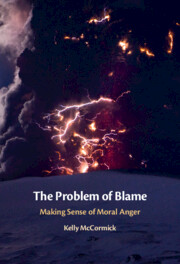Book contents
- The Problem of Blame
- The Problem of Blame
- Copyright page
- Dedication
- Contents
- Acknowledgments
- Introduction
- Part I The Permissibility of Blame
- Part II Prescriptive Preservationism and Eliminativism
- Chapter 5 The Methodological Burdens for Eliminativism
- Chapter 6 Free Will, Responsibility, and Reference
- Chapter 7 Facing the Dark Side
- References
- Index
Chapter 5 - The Methodological Burdens for Eliminativism
from Part II - Prescriptive Preservationism and Eliminativism
Published online by Cambridge University Press: 21 April 2022
- The Problem of Blame
- The Problem of Blame
- Copyright page
- Dedication
- Contents
- Acknowledgments
- Introduction
- Part I The Permissibility of Blame
- Part II Prescriptive Preservationism and Eliminativism
- Chapter 5 The Methodological Burdens for Eliminativism
- Chapter 6 Free Will, Responsibility, and Reference
- Chapter 7 Facing the Dark Side
- References
- Index
Summary
Here I explicate two methodological burdens for the kind of eliminativist views about free will and moral responsibility that might threaten a prescriptive preservationist view of reactive blame. The first burden is that eliminativists must fix the skeptical spotlight, and offer at least some comparative support for their claim that the error they identify for free will and moral responsibility that threatens blame cannot be resolved by abandoning some other assumption, belief, or feature of our concept. Second, eliminativists must explicitly motivate elimination over some variety of revisionist preservation. I call this second burden the motivational challenge, and examine two possible eliminativist strategies for meeting it. The first involves appeals to gains and losses intended to directly motivate elimination, and the second involves explicit appeal to some claim about the essence of free will and moral responsibility. What both of these strategies reveal is that their success ultimately depends on thorny issues about reference and essence.
- Type
- Chapter
- Information
- The Problem of BlameMaking Sense of Moral Anger, pp. 127 - 151Publisher: Cambridge University PressPrint publication year: 2022

